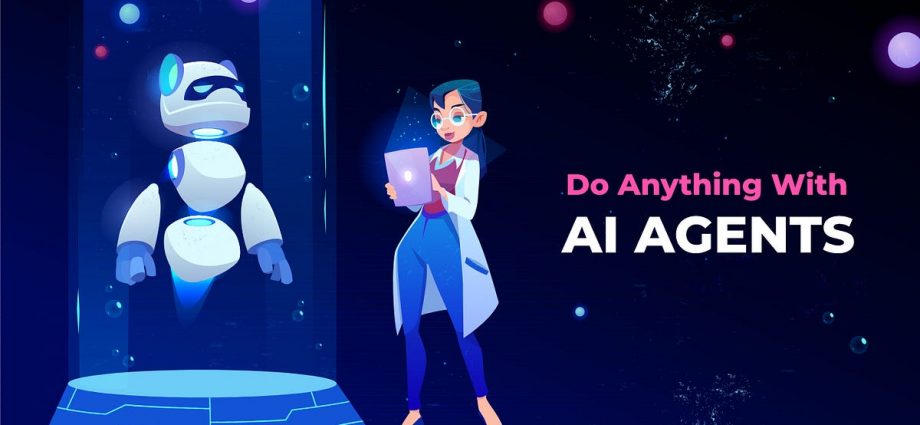Artificial Intelligence (AI) is transforming industries across the globe, enabling businesses to operate more efficiently, make data-driven decisions, and automate complex processes. Among the most significant advancements in AI technology are AI agents, sophisticated programs capable of performing a wide range of tasks, from customer service to advanced analytics. Businesses that build AI agents and integrate them into their workflows can significantly enhance productivity, reduce costs, and streamline operations. This blog explores how AI agents are revolutionizing business efficiency, the AI agent development process, and the steps businesses can take to develop AI agents tailored to their needs.
Understanding AI Agents and Their Capabilities
What Are AI Agents?
AI agents are software entities that perform tasks autonomously, learn from data, and make intelligent decisions. These agents operate based on pre-programmed rules, machine learning models, or deep learning algorithms. They interact with users, software systems, and even other AI agents to complete tasks efficiently.
Key Capabilities of AI Agents
Automation of Repetitive Tasks: AI agents handle mundane, time-consuming activities like scheduling, data entry, and email responses.
Data Analysis and Insights: These agents process large volumes of data to generate actionable insights for businesses.
Customer Support and Chatbots: AI-driven chatbots and virtual assistants provide instant support, enhancing customer satisfaction.
Decision-Making Assistance: AI agents help executives make informed decisions by analyzing real-time data and market trends.
Process Optimization: AI optimizes supply chain management, inventory control, and workforce planning for better efficiency.
How AI Agents Improve Business Efficiency?
1. Enhancing Productivity and Reducing Workload
AI agents take over time-consuming tasks, allowing human employees to focus on strategic initiatives. Businesses that develop AI agents for workflow automation can reduce manual effort, minimizing errors and increasing output.
2. Cost Savings Through Automation
By building AI agents, companies can lower operational costs by reducing reliance on human labor for repetitive tasks. AI-powered solutions minimize overhead expenses, making businesses more competitive.
3. Real-Time Data Processing and Decision Making
AI agents analyze vast amounts of data in real time, providing businesses with accurate insights. Organizations that invest in AI agent development gain a competitive edge by making faster, data-driven decisions.
4. Personalized Customer Experience
With AI-powered chatbots and virtual assistants, businesses can deliver personalized interactions at scale. These AI agents understand customer behavior, tailor recommendations, and resolve issues efficiently.
5. Streamlining Business Operations
AI agents optimize internal processes by monitoring performance, predicting potential issues, and suggesting improvements. This ensures seamless workflow management and operational continuity.
Steps to Develop AI Agents for Business
Step 1: Define Business Objectives
Before you build AI agents, outline your specific business goals. Identify areas where AI can create the most impact, such as customer service, marketing automation, or sales forecasting.
Step 2: Choose the Right AI Technologies
Selecting the appropriate AI technologies is crucial for effective AI agent development. Some of the core technologies include:
Natural Language Processing (NLP) enables chatbots and virtual assistants to understand and respond to human language.
Machine Learning (ML) for predictive analytics and decision-making
Robotic Process Automation (RPA) for automating workflows
Computer Vision for AI-powered image and video recognition
Step 3: Gather and Prepare Data
AI agents rely on quality data for training. Collect relevant business data, clean and preprocess it, and ensure it aligns with your business goals. Proper data structuring improves AI model accuracy and efficiency.
Step 4: Develop AI Models and Algorithms
Building an AI agent involves selecting the right algorithms, training models, and testing their performance. AI models should be continuously improved through machine learning techniques to enhance accuracy.
Step 5: Integrate AI Agents into Business Processes
Once developed, AI agents need to be seamlessly integrated into your business operations. Whether it’s an AI chatbot for customer support or an AI-powered analytics tool, integration should align with existing workflows.
Step 6: Monitor and Optimize AI Performance
After deployment, continuously monitor AI agent performance and make necessary adjustments. AI agents learn and improve over time, so regular updates and refinements ensure long-term efficiency.
Use Cases of AI Agents Across Industries
1. AI in Customer Service
Companies like Amazon and Apple use AI-powered chatbots and voice assistants to provide 24/7 customer support, reducing human intervention while improving response times.
2. AI in Marketing and Sales
Businesses that develop AI agents for marketing benefit from automated ad placements, email marketing campaigns, and predictive sales analytics. AI agents analyze customer behavior, optimizing marketing efforts.
3. AI in Finance and Banking
AI agents detect fraudulent transactions, automate compliance reporting, and provide financial advice based on customer spending patterns, enhancing security and customer experience.
4. AI in Healthcare
AI-powered systems assist in diagnosing diseases, managing patient data, and optimizing hospital operations. AI agents streamline appointment scheduling and medical record management.
5. AI in Supply Chain and Logistics
AI agents improve supply chain efficiency by predicting demand, optimizing inventory levels, and reducing delivery times through automated logistics planning.
Overcoming Challenges in AI Agent Development
While AI agents offer significant advantages, businesses must navigate challenges such as:
Data Privacy and Security: Ensuring AI agents comply with data protection regulations.
AI Bias and Fairness: Developing AI models that provide unbiased and ethical decisions.
Integration Complexity: Seamlessly integrating AI agents with existing business systems.
Employee Adaptation: Training staff to work alongside AI agents effectively.
Future Trends in AI Agent Development
As AI continues to evolve, businesses should be prepared for emerging trends:
Hyper-Personalization: AI agents will deliver even more tailored customer experiences.
AI and IoT Integration: AI-powered devices will enhance automation in smart environments.
Advanced Conversational AI: AI chatbots will become more human-like in interactions.
Autonomous AI Agents: Fully self-sufficient AI agents will handle end-to-end business tasks without human intervention.
Conclusion
AI agents are transforming business efficiency by automating processes, providing deep insights, and optimizing decision-making. Companies that build AI agents and invest in AI agent development can unlock new levels of productivity, customer engagement, and profitability. By understanding how to develop AI agents tailored to specific business needs, organizations can stay ahead of the competition and harness the full potential of AI technology.


